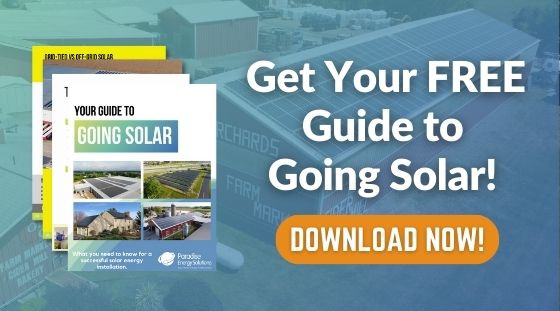When purchasing a solar system, you have two main options to choose from - grid-tied and off-grid. As the name implies, grid-tied solar means the solar system is connected to the electrical grid, and off-grid solar means the solar system is not connected to the grid.
In order to pick the right type of system, it’s important to list the goals you’re hoping to achieve by adding solar energy. Here at Paradise Energy Solutions, we only sell grid-tied solar systems, but we realize it’s important to consider the pros and cons of both grid-tied solar and off-grid solar, so you can identify the system that best meets your goals.
Grid-tied Solar Systems
A grid-tied solar system is connected to the electrical grid and requires the grid to be running for the solar system to produce energy.
Pros of a Grid-Tied Solar System:
- Grid-tied systems tend to be the less expensive option, due to not needing batteries and other equipment
- This type of system is great for those who don’t have the room or financing to install a solar system big enough to cover 100% of their energy usage. You can continue to pull electricity from the grid if needed
- Net Metering allows the electricity generated by a solar system to offset the electricity used from the grid during the night or cloudy days
- The grid becomes your cost-effective, reliable storage solution
- In some regions, Solar Renewable Energy Credits (SRECs) allow owners of a grid-tied system to receive extra income by selling the SRECs their system produces
Cons of a Grid-Tied Solar System:
- If the grid goes down your system will shut off, leaving you without power. This is required to prevent energy from back feeding into the grid to keep utility workers safe. Your grid-tied system will automatically shut off when the grid goes down, and will also automatically turn back on when power is restored
- You’re not completely independent from the grid
Off-Grid Solar System
Many people like the idea of installing an off-grid solar system because of the independence and the stability the solar system will bring to their lives. However, this is only achievable with the appropriate equipment and batteries.
Pros of a Off-Grid Solar System:
- Completely independent from the grid
- A great solution for remote locations and underdeveloped communities
Cons of a Off-Grid Solar System:
- They are more costly
- Batteries are required to deliver electricity consistently throughout the day and night
- It could require a lifestyle change to reduce energy consumption
- Surplus energy production could go to waste
- Cannot rely on the grid at night or on cloudy days
- Batteries require maintenance, have a relatively short lifespan, and degrade rapidly
Conclusion
For most people, a grid-tied solar system is a solid investment that provides security and predictability for their business, farm or home. The payback for a grid-tied solar system is shorter and there are fewer components that could need to be replaced in the future. An off-grid solar system is a good option for some cabins and more isolated areas, however at this time, off-grid systems struggle to compete with the payback and ROI of a grid-tied system.



